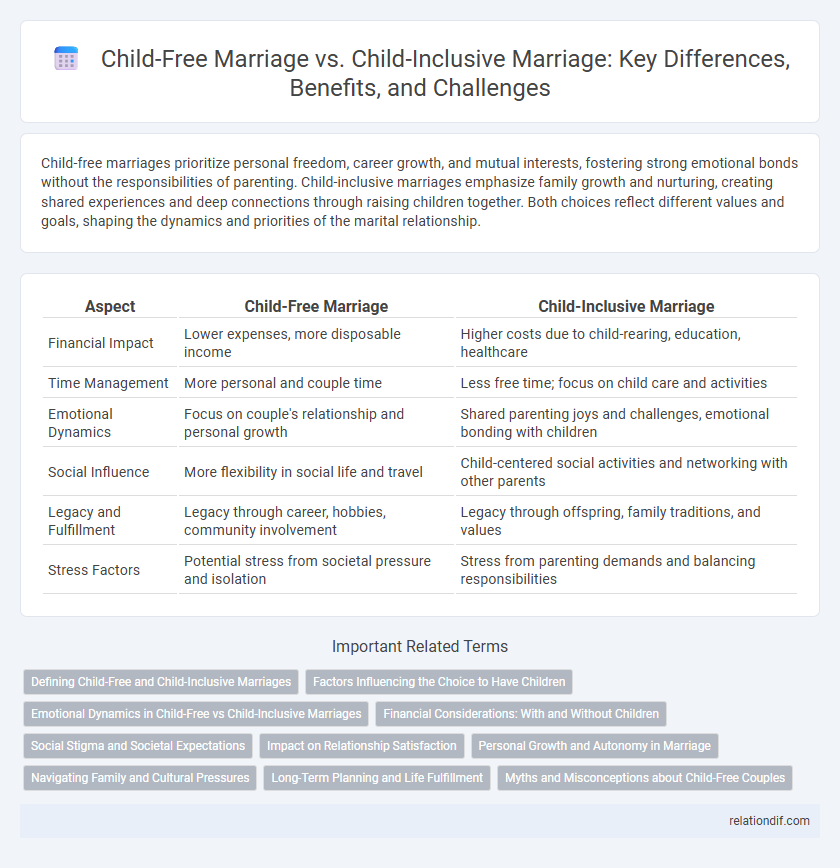Child-free marriages prioritize personal freedom, career growth, and mutual interests, fostering strong emotional bonds without the responsibilities of parenting. Child-inclusive marriages emphasize family growth and nurturing, creating shared experiences and deep connections through raising children together. Both choices reflect different values and goals, shaping the dynamics and priorities of the marital relationship.
Table of Comparison
| Aspect | Child-Free Marriage | Child-Inclusive Marriage |
|---|---|---|
| Financial Impact | Lower expenses, more disposable income | Higher costs due to child-rearing, education, healthcare |
| Time Management | More personal and couple time | Less free time; focus on child care and activities |
| Emotional Dynamics | Focus on couple's relationship and personal growth | Shared parenting joys and challenges, emotional bonding with children |
| Social Influence | More flexibility in social life and travel | Child-centered social activities and networking with other parents |
| Legacy and Fulfillment | Legacy through career, hobbies, community involvement | Legacy through offspring, family traditions, and values |
| Stress Factors | Potential stress from societal pressure and isolation | Stress from parenting demands and balancing responsibilities |
Defining Child-Free and Child-Inclusive Marriages
Child-free marriages refer to partnerships where couples consciously choose not to have children, prioritizing personal freedom, career goals, and shared interests. Child-inclusive marriages, in contrast, are defined by the presence of children, shaping couple dynamics through parenting responsibilities and family-focused priorities. Understanding these distinctions highlights the diverse lifestyles and values influencing marital satisfaction and long-term relationship goals.
Factors Influencing the Choice to Have Children
Couples deciding between a child-free marriage and a child-inclusive marriage often weigh factors such as personal values, career goals, financial stability, and health considerations. Psychological readiness and societal expectations also play critical roles in influencing the choice to have children. Access to family planning resources and cultural background can significantly impact this deeply personal decision.
Emotional Dynamics in Child-Free vs Child-Inclusive Marriages
Emotional dynamics in child-free marriages often revolve around individual growth, shared experiences, and couple-centric communication, fostering intimacy and personal fulfillment. Child-inclusive marriages typically navigate complex emotional landscapes involving parental responsibilities, balancing nurturing roles with partner connection, which can heighten stress but also deepen emotional bonds through shared parenting goals. Understanding these nuanced emotional patterns aids couples in managing expectations and strengthening relational satisfaction regardless of family structure.
Financial Considerations: With and Without Children
Child-free marriages often experience greater financial flexibility, allowing couples to allocate more resources toward savings, travel, and personal pursuits without the added expenses of childcare, education, and healthcare costs typical in child-inclusive marriages. Couples with children face increased economic demands, including costs for schooling, extracurricular activities, healthcare, and future college expenses, which can significantly impact household budgets and long-term financial planning. Budgeting strategies in child-inclusive marriages typically emphasize stable income streams and insurance coverage, whereas child-free couples may prioritize investment opportunities and discretionary spending.
Social Stigma and Societal Expectations
Child-free marriages often face social stigma rooted in traditional societal expectations that prioritize procreation as a key marital purpose, leading to misconceptions and judgment from extended family and community. Couples choosing to remain child-free challenge conventional norms by emphasizing personal fulfillment, career goals, and mutual companionship over parenthood. Society's evolving attitudes gradually increase acceptance, yet many child-free couples still navigate pressures to conform to established ideals of marriage and family life.
Impact on Relationship Satisfaction
Child-free marriages often report higher relationship satisfaction due to increased personal freedom and fewer stressors related to parenting responsibilities. In contrast, child-inclusive marriages may experience greater challenges but also enhanced emotional bonding from shared parenting goals. Research indicates that relationship satisfaction depends more on effective communication and mutual support than on the presence or absence of children.
Personal Growth and Autonomy in Marriage
Child-free marriages often provide greater opportunities for personal growth and autonomy, as partners can dedicate more time and resources to individual interests and ambitions without the responsibilities associated with parenting. In contrast, child-inclusive marriages may foster growth through shared parenting experiences and collaboration, promoting emotional maturity and resilience as couples navigate family dynamics. Both arrangements require communication and mutual respect to balance personal development with the partnership's evolving needs.
Navigating Family and Cultural Pressures
Couples in child-free marriages often face significant family and cultural pressures urging procreation, challenging their personal values and lifestyle choices. Navigating these expectations requires clear communication and boundary-setting to maintain relationship autonomy and mental well-being. In contrast, child-inclusive marriages may experience pressure to conform to ideal parenting norms, necessitating support networks and balanced collaboration to manage societal and familial demands effectively.
Long-Term Planning and Life Fulfillment
Child-free marriages often allow couples to pursue personalized long-term goals with greater financial flexibility and emotional independence, enhancing life fulfillment through career advancement, travel, and hobbies. In contrast, child-inclusive marriages require strategic planning around education, healthcare, and support networks, fostering fulfillment through nurturing family bonds and legacy building. Both approaches demand clear communication and shared values to ensure sustainable happiness and aligned future visions.
Myths and Misconceptions about Child-Free Couples
Child-free marriages often face myths such as assuming these couples are selfish, unhappy, or destined for failure, which research consistently disproves by showing high satisfaction and strong relationship quality. Contrary to misconceptions, child-free couples experience deep social connections and fulfill personal goals without parenthood, challenging the traditional narrative that equates marriage success solely with having children. Understanding these myths is essential to respecting diverse marriage choices and promoting inclusive societal attitudes toward family structures.
child-free marriage vs child-inclusive marriage Infographic

 relationdif.com
relationdif.com